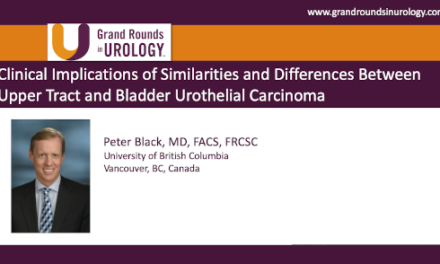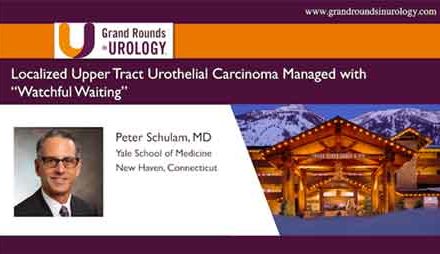Seth P. Lerner, MD, presented “Advances in Treating Upper Tract Urothelial Cancer” during the Innovations in Urologic Practice 2020 virtual conference in September 2020.
How to cite: Lerner, Seth P. “Advances in Treating Upper Tract Urothelial Cancer.” September 26th, 2020. Accessed Dec 2024. https://dev.grandroundsinurology.com/advances-in-treating-upper-tract-urothelial-cancer/
Advances in Treating Upper Tract Urothelial Cancer – Summary
Seth P. Lerner, MD, Professor of Urology and holder of the Beth and Dave Swalm Chair in Urologic Oncology in the Scott Department of Urology at Baylor College of Medicine, discusses developments in upper tract urothelial carcinoma (UTUC) treatment. He delivers a rationale for adjuvant therapy based on a lack of clinical staging accuracy, a lack of high-level evidence to support perioperative systemic therapy, the perceived benefit in cases of high-risk bladder cancer, and the ability of pathologic staging to identify patients most likely to benefit. He then reviews the POUT trial of adjuvant chemotherapy, noting that it found a statistically significant benefit in disease-free survival and metastasis-free survival. Dr. Lerner continues by summarizing guideline statements. The EAU statement recommends perioperative chemo to patients with muscle invasive UTUC. ICUD states that it is unknown if adjuvant chemotherapy or waiting for the development of clinically evident disease is better. The French ccAFU recommends adjuvant chemotherapy after radical nephroureterectomy in pT2-T4 N0-3 M0 disease. Dr. Lerner then discusses neoadjuvant therapy, which studies suggest is beneficial to patients with optimized renal function. A Hopkins study specifically displayed a pathologic complete response of 9.4%, while the EA8141 trial found a total pathologic complete response of 13.8%. Dr. Lerner continues with a review of management options for low-grade UTUC, a rare disease with limited treatment options. He posits that a kidney-sparing treatment option is needed for patients, as there is a high chance of recurrence and kidney damage with the treatments currently available. Dr. Lerner theorizes that if durability of complete response following ablation with UGN-101 is demonstrated, this could provide a potential new kidney-sparing treatment for patients with low-grade UTUC. Dr. Lerner concludes with a discussion of the OLYMPUS study on UGN-101, which found a complete response in 59% of patients.
About the Innovations in Urologic Practice 2020 virtual conference:
Presented by co-chairs Mohit Khera, MD, MBA, MPH, and Michael Coburn, MD, FACS, the Innovations in Urologic Practice conference provides a detailed review and commentary on multiple genitourinary and urologic diseases. Among the featured oncological topics are bladder cancer and immunotherapies, as well as upper tract cancer management, prostate cancer, including state-of-the-art imaging, focal therapy, and MRI. Experts also discuss new tools and techniques for nephrectomy and treating advanced renal cell carcinoma. In terms of general urological approaches, the conference also includes pelvic reconstruction and trauma, men’s health topics like male infertility and sexual dysfunction, and ways to diagnose and treat infections in the urology patient. Dr. Lerner presented this talk virtually at the 2020 conference.
ABOUT THE AUTHOR
Seth P. Lerner, MD, is a Professor of Urology and holds the Beth and Dave Swalm Chair in Urologic Oncology in the Scott Department of Urology at Baylor College of Medicine. He is also Director of Urologic Oncology and the Multidisciplinary Bladder Cancer Program and Faculty Group Practice Medical Director for the Urology Clinic at Baylor. He earned his medical degree from Baylor College of Medicine, completed a surgical internship at Virginia Mason Hospital in Seattle, and returned to Baylor for his residency training. He completed a two-year fellowship at the University of Southern California in Urologic Oncology and Reconstructive Surgery under Peter Jones and Don Skinner before returning to join the full-time Baylor faculty in 1992. His clinical practice, education, and research activities are devoted to urologic oncology, particularly lower and upper tract urothelial cancer. Dr. Lerner is an author on over 190 peer-reviewed articles, and co-editor of the comprehensive Textbook of Bladder Cancer. He is the founding Co-Editor-in-Chief of the Bladder Cancer journal. He established and directs the multi-disciplinary Bladder Cancer Research Program at Baylor, and his research interests include the use of selective estrogen receptor modulators for the treatment of bladder cancer, gene therapy, integrated genomic analysis of bladder and upper urinary tract cancers, and outcomes of radical cystectomy and pelvic lymphadenectomy. He has 25 years of experience as a clinical investigator for both NCI and industry-funded clinical trials. He is the PI of the ongoing SWOG NCI Phase III trial comparing extended vs. standard pelvic lymphadenectomy at the time of radical cystectomy. He is Chair of the Local Bladder Cancer Committee of SWOG, founding and former Co-Chair of the NCI Bladder Cancer Task Force and current Co-Chair of the NCI CTEP Genitourinary Steering Committee, and he has co-chaired the Analysis Working Group of The Cancer Genome Atlas Project for muscle-invasive bladder cancer for the past decade. He is very active in the Bladder Cancer Advocacy Network (BCAN) as a member of the Board of Directors, and is Past Chair of the Bladder Cancer Think Tank and Co-Chair of the Management Committee of the Bladder Cancer Research Network. Dr. Lerner is an active member of the prestigious American Association of Genitourinary Surgeons and is listed routinely among “America’s Top Doctors” and “Best Doctors in America.”





